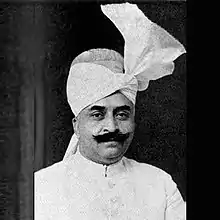Awan (tribe)
Awan (Punjabi: Shahmukhi:اعوان, Gurmukhi:ਅਵਾਨ) (Urdu: اعوان) is a tribe living predominantly in northern, central, and western parts of Pakistani Punjab, with significant numbers also present in Khyber, Azad Kashmir, and to a lesser extent in Sindh and Balochistan.
History
Aitzaz Ahsan, a Pakistani lawyer and politician, notes that the Awans believe themselves to be of Arab origin but that there is little to support the claim. He notes that other tribes in the region of the Indus make similar claims as an assertion of their superiority but that there is no evidence of a historic migration of Arabs into the region, nor any obvious racial connection between the Semitic Arabs and these tribes, whose stock seems to be Central Asian or aboriginal. He also doubts how the lineage from so few putative Arab descendants could have expanded in the intervening time to become the vast number of people who now constitute these tribes.[1] The claim is also noted by Jamal J. Elias, who records that they believe themselves to be descended from Ali ibn Abu Talib and that the claim of Arab descent gives them "high status in the Indian Muslim environment".[2]
Christophe Jaffrelot says:
The Awan deserve close attention, because of their historical importance and, above all, because they settled in the west, right up to the edge of Baluchi and Pashtun territory. Legend has it that their origins go back to Imam Ali and his second wife, Hanafiya. Historians describe them as valiant warriors and farmers who imposed their supremacy on the Janjua in part of the Salt Range and established large colonies all along the Indus to Sind, and a densely populated center not far from Lahore.[3]
People of the Awan community have a strong presence in the Pakistani Army[4] and a notable martial tradition.[5] They were listed as an "agricultural tribe" by the British Raj in 1925, a term that was then synonymous with classification as a "martial race".[6]
Notable people


- Nawab Malik Amir Mohammad Khan – former Chief of the Awan tribe – Governor of West Pakistan from 1960–66[7]
- Air Marshal Nur Khan – Commander in Chief of the Pakistan Air Force, 1965–69, Governor of West Pakistan, 1969–70, and recipient of the Hilal-i-Jurat[8]
- Sultan Bahu - A Sufi mystic, poet, scholar and founder of mystic tradition known as Sarwari Qadiri[9]
- Mir Sultan Khan - A chess master also believed by some to be the greatest natural chess player of modern times.[10]
- Abdul Mannan Wazirabadi - Islamic scholar, jurist and muhaddith.[11]
References
- Ahsan, Aitzaz (1996). The Indus Saga and the Making of Pakistan. Oxford University Press. p. 88. ISBN 0195776933.
And this inclination is not exclusive to the Syeds for whom the lineage is essential to their status, regardless of their position in life. Many of the Pashtuns, the Baloch, and such Punjabi tribes as the Arains and the Awans, claim a similar descent. There appears to be little tangible historical evidence of any mass movement of the Arab race towards Indus. Nor does evidence of racial stock substantively corroborate such claims. The Arabs were primarily Semites. The Indus tribes were either Central Asian or aboriginal, or a mixture of both. Nor could the descendants of a few Arab families have multiplied in such numbers as to inhabit the entire Indus region. Many of these claims appear to be fictional.
- J. Elias, Jamal (1998). Death Before Dying: The Sufi Poems of Sultan Bahu. University of California Press. p. 12. ISBN 978-0-52021-242-8.
- Jaffrelot, Christophe (2004). A History of Pakistan and Its Origins (Reprinted ed.). Anthem Press. p. 205. ISBN 978-1-84331-149-2.
- Jones, Philip Edward (2003). The Pakistan People's Party: Rise to Power. Oxford University Press. p. 61. ISBN 0195799666.
This [Awan] tribe is perhaps the most heavily recruited tribe in the [Pakistan] Army.
- Ali, Imran (1998). Punjab under Imperialism, 1885–1947. Princeton University Press. p. 114. ISBN 1400859581.
- Mazumder, Rajit K. (2003). The Indian Army and the Making of Punjab. Orient Longman. p. 105. ISBN 9788178240596.
- Khan, Jahan Dad (2001). Pakistan Leadership Challenges. Oxford University Press. p. 72. ISBN 0195795873.
- Khan, Roedad (1999). The American Papers: Secret and Confidential India-Pakistan-Bangladesh Documents, 1965-1973. Oxford University Press. p. 265. ISBN 0195791908.
- Frembgen, Jürgen Wasim (2006). The Friends of God: Sufi Saints in Islam, Popular Poster Art from Pakistan. Oxford University Press. p. 103. ISBN 0195470060.
- Sultan, Ather; Sultan, Atiyab (17 May 2020). "CHESS:The Wrath of Khan". Dawn. Retrieved 12 June 2020.
- Ustad-e-Punjab (teacher of Punjab), in Urdu Language, by Maulana Majeed Sohadravi, Darussalam Pakistan/Muslim Publication, Lahore. page 41
Further reading
- Qadeer, Mohammad (22 November 2006). Pakistan - Social and Cultural Transformations in a Muslim Nation. Taylor & Francis. p. 71. ISBN 1134186177.